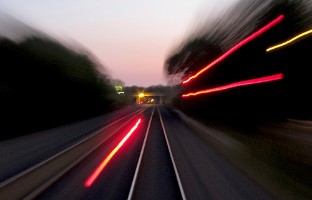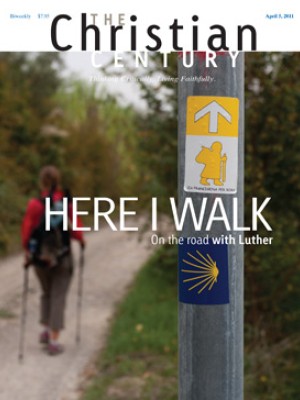The train I ride

The train I ride," Elvis sang, "is 16 coaches long." The train I ride, at least a dozen times a year, stretches four or five coaches long. It is Amtrak's Pere Marquette line between Chicago and Grand Rapids, Michigan. Travelers on the line are businesspeople, shoppers, baseball fans, family visitors, college students and—without fail—a goodly portion of Amish. Passengers nearly always fill the Pere Marquette, but, despite that, the line teeters annually in peril of elimination.
Americans are shortsighted about nothing so much as passenger trains. Sooner or later, and usually sooner, conversations about passenger trains and Amtrak in particular sputter with the dirty "s-word": subsidies. For some, that word alone is a conversation-stopper. It is taken as self-evident that government subsidies should be eliminated, and Amtrak is a favorite target.
Read our latest issue or browse back issues.
Such conversations forget (or intentionally neglect) the reality that all American means of transportation depend on "subsidies." Eisenhower's construction of the interstate highway system was one of the most monumental—and expensive—public works projects in history. Concrete and asphalt roadways require much more frequent and more costly maintenance than other forms of transportation. Such "user-fees" as gasoline taxes are far from covering all these costs, and tax dollars make up the difference. Though it is comparatively inefficient and disproportionately polluting, America massively subsidizes automobile transportation.
Even walking, that most basic and independent means of transportation, depends on "subsidies" such as sidewalks, street crossings and park trails. And who really believes that nationwide air travel would be safer and more efficient without government coordination and regulation of air traffic control?
Admittedly, Amtrak makes an easy target. It is, as theologian Stephen Long has remarked, a creature of "state-sponsored monopoly capitalism," representing the worst of both the capitalist and the socialist worlds. Underfunded from its beginnings in the 1970s, it is a ramshackle affair of old equipment and heavy borrowing of lines built for and still favoring freight trains.
These encumbrances are largely responsible for the delays and even stoppages Amtrak riders endure. In one particularly infamous episode on the Pere Marquette, passengers delayed for an entire workday fled across snow-covered fields to meet friends and relatives who had received desperate cell-phone calls and waited along a nearby highway.
Think of a factory in which all machinery is owned, built and maintained by someone other than the business operating it and you begin to get a picture of the challenge Amtrak faces. Or, to take a transportation metaphor, imagine the interstate road system if it were composed by stitching together state highways, county roads in various states of repair and gravel country roads.
Despite these handicaps, Amtrak still largely manages to embody the advantages of rail travel. Airline transportation is unsuitable for distances fewer than 400 miles and has, with its regular delays and cripplingly tight seating, become an outright ordeal. Railroad seating is spacious and comfortable, and trains include lavatories in which you can actually stand up. Train travel allows, at all times during the trip, walking about the coaches and visiting a dining car that features not exactly gourmet cuisine, but still a variety of beverages and hot food at reasonable prices. When riding a train, unlike driving a car, you can comfortably and safely work, sleep, read, daydream or pray. (There may be plenty of prayer on airplanes, but it is for survival or sheer endurance.)
Then there is what might be called the romance factor. Trains pass by prairies, mountainsides, sun-dappled lakes and woodland streams. Neither isolated, as in an automobile, nor painfully crammed together, as on a plane, train passengers enjoy the opportunity for relaxing conversation with strangers or friends. The multifarious romance of trains is proved in the vast corpus of American train songs that honor working people, imagine an escape to wider or better places and anticipate the arrival of lovers borne back home. By comparison, the canon of American plane songs is paltry, and the songs are usually desolate in mood (consider "Leavin' on a Jet Plane," "In the Early Morning Rain," "Silver Wings") and often about beastly machines taking a loved one away. "Roaring engines, fading somewhere out of sight . . . taking you away, leaving me lonely."
As the country's population grows, roadways will become even more crowded. As the amount of oil in the earth disappears, gasoline prices will rise to unaffordable heights. The ecological costs of travel by automobile will continue to grow. Eventually, we will reach a tipping point: passenger train travel will make sense to most Americans. We can only hope that by then some semblance of Amtrak will remain to save us from the expense and grief of starting from scratch. Until then, even a slow train is better than no train at all.






